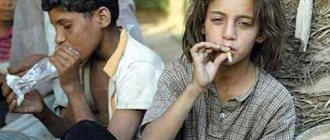Features of adolescence
From a psychological point of view, the age of transition from childhood to adulthood begins and ends individually. The child begins to strive for independence, wants to find his place in society, and sometimes even change his immediate environment. He begins to develop political sympathies - often they are opposite to his parents'. The views reveal categoricalness and intolerance—youthful maximalism. Behavior often becomes uncontrollable and aggressive.
During the transition period, romantic relationships arise. The child searches for his sexual identity and begins to be sexually active. He may try smoking, use alcohol or drugs, strives to make his own decisions and rejects everything that seems uncomfortable to him.
Precautionary measures
Prevention of the development of asociality in children and adolescents includes the following tips:
- take care of the baby’s emotional state;
- become a positive example for your child, promote a healthy lifestyle and correct values;
- create intra-family trusting relationships;
- If necessary, attend psychological consultations in a timely manner.
Now you know what people with antisocial behavior are like. This does not mean that it is necessary to isolate yourself from communication with such individuals. It would be much more correct to put an antisocial person on the right path, to help him socialize, if this is in your power.
Antisocial behavior
Antisocial behavior is a persistent deviation from generally accepted norms. Forms of antisocial behavior in adolescents include emotional, behavioral and psychotic disorders, eating disorders, self-harm and suicide, substance use and risky sexual behavior. Vagrancy, gambling, foul language, lies, and hysterical attacks are possible. Source: T.T. Byazrova Social norm and social deviations in the behavior of minors // Current issues of modern science, 2010
Types of antisocial behavior
- Disapproved - occasional mischief and pranks.
- Condemned – causes systematic condemnation from adults.
- Deviant – immoral and immoral actions.
- Addictive – actions committed under the influence of alcohol and drugs.
- Delinquent – pre-criminal, administrative-delicate.
- Criminal – illegal, violation of legal requirements.
Psychiatrists' opinion
There are many circumstances that contribute to the development of deviation. Experts say that it may be associated with biological reasons, characteristics of upbringing, or a certain way of thinking. There are two concepts - antisocial behavior and antisocial. How are they different? Many scientists associate these phenomena with the presence of mental disorders. Psychiatrists distinguish two types of individuals with such deviations. According to this point of view, antisocial individuals include:
- People who have isolated themselves from society. They have a special inner world. There is almost no contact with others. The experiences of such individuals, their emotions, attachments are not manifested externally and are unknown to others. The isolation of such individuals does not cause them suffering. Low-income people with this disorder become vagabonds. The rich are gaining a reputation as eccentric eccentrics.
- Persons who are unable to establish contacts with others. They cannot function normally in society and experience great suffering as a result. Such an individual perceives any interaction as torture. Therefore, he tries with all his might to hide from others. Others notice oddities in a person’s behavior (excessive shyness, unceremoniousness, ridiculous actions) and also instinctively avoid communication. As a result, the antisocial personality is deprived of friendship and romantic relationships. Such people are forced to spend a lot of time at home and not go anywhere. They worry about being unable to realize themselves at work or start a family.
These personality types do not have a negative impact on society.
According to psychiatrists, cases of antisocial behavior are characterized by a negative impact on others. Such manifestations include delinquency and criminal behavior. Experts explain such deviations as the development of a serious mental illness.
Causes of appearance in children
Biological. The prefrontal cortex, responsible for cognitive control, is just beginning to develop. Therefore, when making decisions, the brain uses the limbic system, which is responsible for the sphere of emotions. The actions of a teenager seem illogical to adults. In reality, a small person is simply not yet able to control emotional swings and the need for strong sensations. Source: A.I. Papkin Deviant behavior and psychological ways of its prevention // Bulletin of RUDN University, Ser. "Psychology and Pedagogy", 2007, No. 2, pp. 6-13
Social – the influence of the media and gender norms, the psychological climate in the family and the role among peers. Harsh parenting practices, sexual abuse, discrimination and social exclusion, bullying and socioeconomic problems increase the risk of antisocial behavior. Risk groups include orphans, members of minorities, teenagers who became parents early or entered into marriage, including forced marriage.
Pedagogical – educational strategy of parents and teachers (for example, hypo-custody or hyper-custody).
Psychological – attention deficit hyperreactivity disorder, neurological and somatoform disorders, autism spectrum disorders, mental retardation.
Educational institutions as a factor
As noted earlier, educational institutions are also responsible for the behavior of their students. Thus, in the process of learning, certain norms of relationships are formed, and socialization in society begins. Teachers must not only guide and manage students, but also participate in the process, quickly and productively respond to abnormal phenomena.
For educational institutions, we can also identify factors that help identify the role of educational processes in the formation of correct behavioral tactics. Among these are:
- social reasons - if a child does not have the opportunity to develop intellectually due to family factors (there is no opportunity to study at home due to the lack of proper conditions), then over time he will noticeably begin to lag behind his peers - and this, in turn, will contribute to disunity in the team , quarrels, insults;
- pedagogical reasons - almost everything in the educational process depends on the teacher, so his main task is to create a comfortable atmosphere for mastering the material. Many teachers choose an authoritarian teaching style, but this causes more problems than it gives results;
- subjective reasons for the individual - this group includes all other factors that are very individual.
Antisocials in literature
Famous literary works will help you learn more about people with antisocial behavior. Among them:
- "1984" (George Orwell).
- "Video Death" (Irvine Welsh).
- “The Perks of Being a Wallflower” (Stephen Chbosky).
- Books about Sherlock Holmes (Arthur Conan Doyle).
- "Metamorphosis" (Franz Kafka).
- "The Girl with the Dragon Tattoo" (Stieg Larsson).
- "Brave New World" (Aldous Huxley).
- "Hannibal" (Thomas Harris).
- "Jane Eyre" (Charlotte Brontë).
Antisocial people are those who either have no motivation for social life or whose behavior contradicts social rules. A mild form of asociality is introversion, an extreme form is schizophrenia.
Deviant behavior is characteristic of children and adults, representatives of different social groups and levels of education. It can be expressed in all sorts of addictions (escape from real life), as well as ignoring moral standards and their violation (even criminal offenses).
Among the common causes of asociality are: biological, social and personal factors. The best way to fight is prevention. It is interesting that an asocial is not always a bad person; they can be geniuses or believers whose religion encourages withdrawal from society.
Treatment
Treatment of dissocial personality disorder is difficult, since the moral norms of such people are formulated in their own way, and it is very difficult to convince them that they are wrong. In childhood and adolescence, consultation with a psychotherapist and family psychotherapy can help. Such conversations are very useful because the doctor will be able to highlight aspects of the relationship between parents and child, understand their essence and try to influence the child through them. If parents are from a dysfunctional family, this may not bring any results, but if they listen to themselves and their child, then perhaps the child’s psycho-emotional state will be restored. The psychotherapist must instill in the patient the normal principles of society, make him feel shame for his bad behavior, ask for forgiveness and show his emotions. Sometimes hypnosis sessions are carried out, and they must be regular to strengthen the result.
In extreme cases, drug therapy is resorted to, especially if the person becomes dangerous to society. Antipsychotics, sedatives, soothing teas and baths are used.
What is asociality?
Asociality is a personality quality that implies behavior that does not comply with the rules of social behavior and moral guidelines. Antisocial people cannot be called lawbreakers. They are usually characterized by indifference, isolation from the public , and their own system of values and priorities that runs counter to established rules. An antisocial person does not want to interact with other people. He rarely makes social contacts.
Given the weak sensitivity of such a person, aggression usually occurs if there is an attempt to impose social norms on her. An antisocial person believes that it is acceptable to react aggressively to various stimuli. To achieve his goals, he is ready to resort to manipulation, lie , and play any role. Antisocial behavior of a person implies adaptation only in certain cases when it is beneficial to him.
Asociality cannot be clearly called a negative concept. For example, introverts can be considered antisocial, since they avoid participation in public life and prefer solitude. But such individuals, as a rule, do not pose a public danger, but are only abstracted from public life.
Diagnostics
Diagnosis of deviant behavior is carried out by a psychiatrist and a clinical psychologist. The following diagnostic methods are used:
- Inspection and conversation. The specialist assesses the patient’s general condition, his emotional state, manner of speech and behavioral traits. Questions are asked about family, study or work, a person’s hobbies and habits.
- Studying patient data. The doctor studies the characteristics from the place of study or work, extracts from the outpatient card from the neurologist, talks with teachers, employers and police officers, if the patient is registered.
- Questioning family and friends. A psychologist or psychiatrist contacts the patient’s immediate environment, asks questions about his psycho-emotional state, character traits and living conditions.
- Psychological testing. To determine the patient's personality characteristics, tests and questionnaires are used: MMOL, PDO, anxiety scale, Eysenck questionnaire.
- Projective methods. Szondi and Rosenzweig tests, visual studies reveal the patient's hidden and suppressed emotions.
After diagnosing and establishing deviant behavior, the patient begins to be treated with psychotherapeutic, psychocorrective and medicinal methods.
Character traits
Let's consider the main signs of an antisocial personality. Such people have the following characteristics:
- Very charismatic. People easily fall in love with such people, because their appearance and behavior are designed to arouse the interest of others. Sociopaths seem bright and unforgettable, extraordinary and successful.
- Most often they belong to wealthy strata of society. And this is not at all because they were spoiled by money, but because of their well-developed ability to benefit. Sociopaths take from the world whatever they want, meet influential people and acquire the necessary connections. Their main goal is power, as well as expensive things and money, in a word, everything that elevates them above others.
- Their revenge is much stronger than their resentment. Sometimes a complete stranger comes under attack, who has not even done anything wrong to the antisocial person. However, she is already beginning to take revenge in advance. For example, an antisocial husband will hit his wife if she does not serve him dinner on time. At the same time, he will be completely confident that he is right. After all, he was offended! The sociopath won’t even think of relating his actions to what happened.
- Risk-prone. It seems that the antisocial personality has practically no instinct of self-preservation. Often such people are partial to dangerous hobbies and adventures, alcohol, drugs and gambling. From the outside it seems that they do not value their own life at all or believe that they will certainly emerge victorious from all situations. And this despite the fact that those who are nearby are suffering or in danger.
It is worth noting that it is sociopaths who most often purchase convertibles in order to drive them only in the warm season. They will be able to shock you on the first date and be etched in your memory forever. Only asocials, without a stable income, will buy the most expensive clothes. It’s also not worth it for a long time to guess what type of personality the lady belongs to, who, without a twinge of conscience, will hang herself on other people’s husbands in the presence of their wives. Yes, all this relates to describing the character of an antisocial personality.
Examples of manifestations of asociality
Social and antisocial people have different attitudes towards relationships in society, moral principles, and compliance with social norms. Asociality can arise as early as early school age. It is usually noticeable already in adolescence.
Examples of manifestations of asociality in childhood:
- the child begins to deceive parents and peers;
- he loses interest in school;
- the child has no friends, no need for contact with peers;
- he may behave aggressively, get into bad company, start breaking laws;
- the child runs away from home and disappears for several days;
- after returning home, he says that he will not do this again, but does not keep his word;
- the child behaves aggressively towards weak people and animals.
Examples of manifestations of asociality in adults:
Antisocial behavior of adults has its own characteristics, in particular, such a person:
- is dishonest about his work;
- does not know how to plan his own future, constantly changes partners, residential addresses, jobs;
- does not know how to show his feelings;
- wants to satisfy only his own needs without taking into account the needs of other people;
- does not want to fulfill material obligations;
- likes to behave aggressively, is ready to commit a crime;
- shows mainly aggressiveness towards his wife (husband), small children, and elderly parents.
General signs of asociality:
- lack of friends;
- sudden mood changes;
- low, high self-esteem;
- inability to concentrate;
- low, excessive appetite;
- sleep problems, insomnia.
Antisocial individuals, as a rule, are impulsive and know how to lie well. But in some cases, their intelligent mask helps them remain unnoticed in society.
Summing up
Asocial is different. He is distinguished by isolation, taciturnity, emotional instability and a desire to be alone with himself. Antisocial individuals want to stay away from society. What provoked such zeal? Wrong value system, difficult circumstances or simple non-acceptance of the main part of the rules and regulations? There is no reliable answer to this question. After all, on the one hand, an antisocial person can be dangerous and mentally unbalanced, but on the other hand, he can be an ordinary person who wants to change this world for the better, and he has no desire to give up communication, he just doesn’t have enough time.
Treatment of sociopathy
Treatment of sociopathic mental disorder is a complex and difficult task. The difficulty lies in the fact that a sociopath does not see any problems at all, and considers his antisocial behavior to be completely normal.
But even if such a person asks for help, the psychotherapist has difficulties in establishing a trusting relationship with the patient. They are necessary for a successful adjustment. It is difficult for a sociopath to maintain a routine and obey recommendations. When carrying out corrective treatment, doctors apply two main rules:
- The presence of an experienced psychiatrist is mandatory.
- Initiation into the results of therapy of a minimal amount of the patient’s environment. This is done to strengthen the patient’s trust in the treating specialist.
When treating a sociopath, doctors also resort to medication. The patient is prescribed antidepressants, sedatives and hormonal drugs. All aggressive medications are prescribed in small doses so as not to cause addiction in a person.
Disease prognosis
Unfortunately, antisocial disorder is difficult to correct. It is impossible to cure such patients. Sociopathy has a disappointing prognosis. We can only hope for the emergence of new, more effective methods of treating these patients. The main thing to remember is that it is never too late to correct mistakes and try to become a healthy person.










